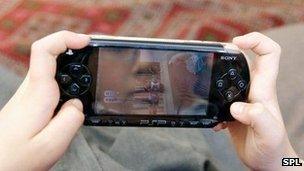Nurses warn about children playing adult video games
- Published

Parents need to be more vigilant over the computer games they allow their children to play, nurses say.
The Royal College of Nursing passed a motion calling for more education and awareness about the risks of children playing adult-rated games.
Nurses said some products on the market were littered with explicit references to violence, sex and drug-taking.
At their annual conference in Harrogate, they said exposure to these images could harm children.
The nurses cited the case of Anders Behring Breivik, who was said to have trained for the attacks he carried out in Norway last summer by using games such as Call of Duty: Modern Warfare and the World of Warcraft.
Jessica Curtis, a student nurse at Hertfordshire University, said: "Some of these games just aren't suitable for children and there is mounting evidence of the harm they can cause.
"We need to educate children and adults about the risks."
She suggested the education programme could be delivered in schools or by nurses and health visitors.
"We just need to be aware of this and making sure parents are too," she added.
Stronger rating
Lindsay Leaver, a nurse from central London, agreed. She said the age rating system for games was much tougher than for films - and it was important that parents paid attention to it.
"Parents need to understand that they have to be checking video games before they buy them for their children."
Other nurses who spoke during the debate explained how they had been involved in treating children harmed by computer game playing.
The government has already pledged to make the system by which video games are rated in the UK "simpler and stronger".
Games will now be rated by the Video Standards Council in line with Europe-wide guidelines.
Previously, additional ratings were decided upon by the British Board of Film Classification (BBFC).
The new system means for the first time that anybody selling a 12-rated game to a child under that age could face jail.
- Published10 May 2012